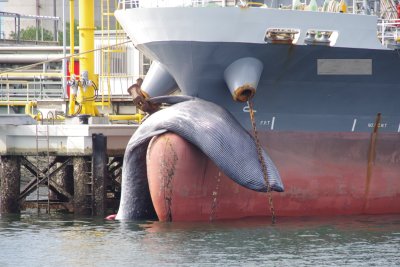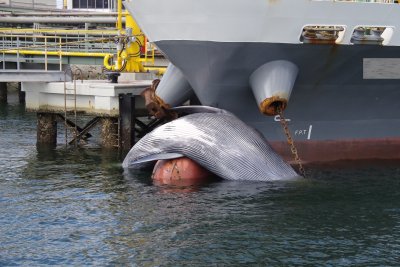A Japanese coast guard has released photos of a boat that pulled into a harbor with a dead whale across its hull.
The images were taken in the port of Mizushima in Kurashiki on September 20.
They show a whale lying limp over the tanker's bow—the most forward part of a ship's underside.
The circumstances of the whale's death are unknown. It is not clear whether the whale had already died when it came into contact with the ship or whether the ship killed the whale.
In a statement emailed to Newsweek along with the photos, the Mizushima Coast Guard Office said: "Unfortunately, we don't know why the whale was brought into a Japanese port on the bow of a Japanese tanker ship, or the reason of death."
According to Japanese news outlet The Yomiuri Shimbun, tankers sail through the Pacific Ocean on their way to this particular port. The crew of the tanker in question said they did not know the whale was there.
The outlet added measures would be considered by local authorities regarding the incident.
The name of the company the tanker belonged to has not yet been reported, and the type of whale has also not been confirmed.


However, The Yomiuri Shimbun reports that, according to the Institute of Cetacean Research in Tokyo, the whale appeared to be a type of fin whale, based on its body surface pattern.
Fin whales are found in ocean habitats. The species is considered to be the second-largest mammal in the world, behind the blue whale.
They are considered to be endangered by the World Wildlife Fund, with an estimated population of between 50,000 and 90,000 worldwide.
While it is still unclear whether a ship strike was responsible for the death of the whale in Japan, the issue of ships killing whales is well-documented and it's not unheard of for dead whales to become lodged on the bows of large vessels, according to the International Whaling Commission (IWC).
The commission adds that many incidents involving whales being hit by ships go unreported, and so it is difficult to assess the conservation implications of ship strikes.
Earlier this year, scientists became alarmed due to the number of dead whales washing up in San Francisco Bay, California, as part of an unusual mortality event affecting the west coast of North America.
Experts told Newsweek that ship strikes were behind some of the deaths, though other causes could not be explained. A number of the whales showed signs of emaciation, suggesting potential ecosystem changes.
Uncommon Knowledge
Newsweek is committed to challenging conventional wisdom and finding connections in the search for common ground.
Newsweek is committed to challenging conventional wisdom and finding connections in the search for common ground.





